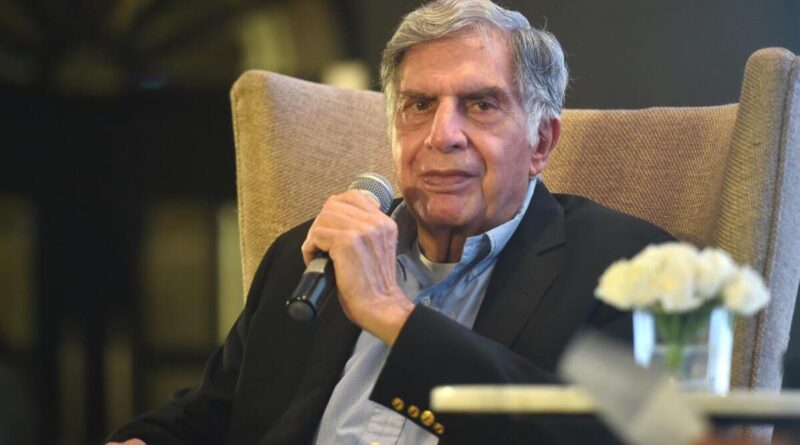Ratan Tata: A Visionary Leader Who Shaped India’s Industrial Landscape
Introduction: Ratan Naval Tata is a name synonymous with innovation, philanthropy, and the extraordinary transformation of India’s industrial landscape. As the former chairman of the Tata Group, one of India’s largest and most respected conglomerates, Ratan Tata’s legacy is an inspiring story of leadership, corporate responsibility, and the drive to elevate Indian businesses to the global stage. His journey from a young man grappling with the weight of expectations to a business magnate leading an empire that spans continents is nothing short of remarkable.
In this article, we will explore Ratan Tata’s early life, his professional journey, and his impact on the Tata Group and India’s industry, along with a comprehensive list of companies under the Tata Group.
Early Life and Education
Ratan Tata was born on December 28, 1937, into one of the most prestigious families in India. He is the great-grandson of Jamsetji Tata, the founder of the Tata Group. Despite being born into privilege, Ratan’s early years were marked by personal challenges, including the separation of his parents when he was just 10 years old. Ratan and his brother, Noel, were raised by their grandmother, Lady Navajbai Tata.
Ratan Tata attended the Campion School in Mumbai and later the Cathedral and John Connon School. He went on to pursue a degree in architecture and structural engineering from Cornell University in the United States. After graduation, he enrolled in the Advanced Management Program at Harvard Business School in 1975, where he learned key management strategies that would later shape his leadership style.
Entry into the Tata Group
Ratan Tata’s entry into the Tata Group came in 1961, when he joined the company as an apprentice on the shop floor of Tata Steel in Jamshedpur. It was a modest start for a scion of the Tata family, but it helped Ratan understand the fundamentals of the business. Over the next few years, he worked across different Tata companies, gaining insight into the group’s diverse operations.
Top Business Ideas Under ₹50,000 Investment in India for 2024: Low Cost, High Profit Ventures
In 1971, Ratan was appointed the Director-in-Charge of National Radio & Electronics Company Limited (NELCO), a struggling Tata company at the time. Although his efforts to revive the company were commendable, the venture ultimately faced challenges due to economic conditions in India. This failure, however, did not deter Ratan, and it taught him valuable lessons in resilience and perseverance.
Becoming Chairman of Tata Group
Ratan Tata’s leadership potential was recognized early on, and in 1991, he succeeded JRD Tata as the chairman of the Tata Group. His appointment was met with skepticism by many within the organization, as Ratan was seen as an outsider by some of the company’s older executives. However, he soon proved his critics wrong with his vision for the company.
One of his first moves as chairman was to consolidate the sprawling conglomerate, which consisted of numerous independent businesses. He streamlined operations, bringing various group companies under a unified brand, making the Tata name synonymous with trust and innovation. Under his leadership, Tata Group transitioned from a largely India-focused business into a global powerhouse.
Key Achievements and Initiatives
1. Global Expansion
Ratan Tata’s most significant achievement was transforming Tata from an Indian-centric conglomerate to a global player. During his tenure, Tata Group acquired several prestigious international brands, including:
- Tetley Tea (UK) in 2000, which made Tata the second-largest tea company in the world.
- Corus Steel (UK) in 2007, one of the largest acquisitions in the steel industry at the time.
- Jaguar Land Rover (UK) in 2008, a landmark acquisition that placed Tata Motors on the global map as a major automobile player.
- Daewoo Commercial Vehicles in South Korea in 2004, further cementing Tata’s presence in the automotive sector.
These acquisitions were not just about expanding the company’s footprint; they were also about introducing global expertise and technology into Tata’s domestic operations, thereby raising the standards of Indian industry.
2. The Tata Nano: A People’s Car
One of Ratan Tata’s most ambitious projects was the development of the Tata Nano, a car designed to be the world’s cheapest, priced at just ₹1 lakh (approximately $2,000). Launched in 2008, the Nano was aimed at making car ownership accessible to millions of Indian families who could only afford two-wheelers.
Though the car did not achieve the commercial success it had hoped for, it remains a testament to Ratan Tata’s commitment to innovation and his desire to create products that benefit the masses. The Nano project showcased his passion for delivering affordable solutions without compromising on quality.
3. Philanthropy and Corporate Social Responsibility
Ratan Tata is as much admired for his philanthropy as for his business acumen. Approximately 66% of Tata Sons, the holding company of Tata Group, is owned by philanthropic trusts like the Sir Dorabji Tata Trust and the Tata Education and Development Trust. These trusts focus on initiatives in education, healthcare, rural development, and the arts.
Under Ratan Tata’s leadership, the group emphasized the importance of giving back to society. Tata companies contributed to improving the quality of life in the communities they operated in, setting a benchmark for corporate social responsibility in India. Notable projects include:
- Tata Memorial Hospital: A premier cancer treatment and research center.
- Tata Institute of Social Sciences and Tata Institute of Fundamental Research: Institutions that have made significant contributions to higher education and research in India.
Leadership and Values
Ratan Tata is known for his humility, ethical leadership, and values-driven management style. His leadership philosophy revolves around the belief that businesses must not only be profitable but also contribute positively to society. This belief is evident in the way Tata companies have conducted business over the years, prioritizing ethical practices and social impact over short-term profits.
Ratan Tata’s ability to remain grounded despite his enormous success is another defining trait. He is known for personally replying to letters from ordinary people, visiting employees during difficult times, and maintaining a low-key lifestyle despite his wealth and influence.
Post-Retirement and Continued Influence
Ratan Tata stepped down as chairman of Tata Sons in 2012, passing the reins to Cyrus Mistry, though he later returned briefly as interim chairman when Mistry was ousted in 2016. Since his retirement, Tata has focused on his philanthropic ventures and investing in startups, particularly in the tech sector.
He has backed several emerging companies, including Ola, Paytm, Snapdeal, and UrbanClap, helping them scale with his invaluable experience and insights. His investments in these companies reflect his belief in the transformative potential of technology and entrepreneurship in India.
List of Companies under the Tata Group
The Tata Group, under Ratan Tata’s leadership, expanded its portfolio significantly, and today, the group consists of over 100 companies operating in more than 100 countries. Some of the key Tata Group companies include:
- Tata Steel – One of the world’s largest steel producers.
- Tata Motors – Known for vehicles like the Tata Nano, Tata Safari, and Jaguar Land Rover.
- Tata Consultancy Services (TCS) – A global leader in IT services and consulting.
- Tata Power – One of India’s largest integrated power companies.
- Tata Chemicals – Operating in the fields of chemicals, crop protection, and consumer products.
- Tata Communications – A leading provider of global digital infrastructure services.
- Tata Consumer Products – Known for brands like Tata Tea and Himalayan Water.
- Taj Hotels – One of Asia’s largest and finest hotel chains, including the iconic Taj Mahal Palace Hotel in Mumbai.
- Voltas – A leading air conditioning and engineering services company.
- Titan – Known for watches, jewelry (Tanishq), and eyewear.
- Trent – Retail operations through brands like Westside and Landmark.
Conclusion
Ratan Tata’s contributions to India’s business ecosystem and society are unparalleled. His visionary leadership not only transformed the Tata Group but also redefined how businesses in India could compete globally. His focus on innovation, ethical leadership, and philanthropy has left an indelible mark on the corporate world. Today, the Tata Group continues to be a beacon of excellence, driven by the values instilled by its legendary leader, Ratan Tata.
Upcoming Cars in India 2025 : Features, Launch Dates, and What to Expect




